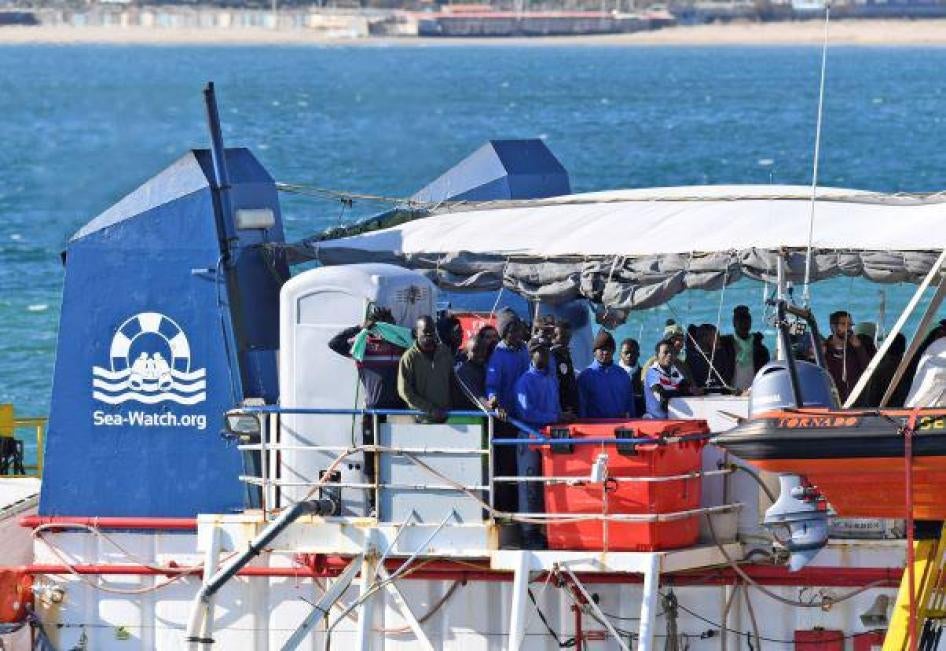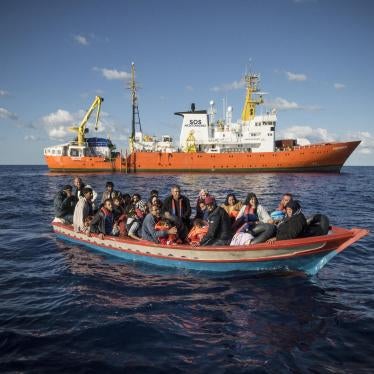(Milan) –The Italian government should firmly reject a proposal to fine shipmasters up to €5,500 for every person they rescue and take to Italy, Human Rights Watch said today. Deputy Prime Minister and Interior Minister Matteo Salvini has proposed this and other problematic anti-rescue measures in a decree to be examined by the government starting as early as today.
“Salvini’s latest salvo in his war on humanitarian rescue puts a price tag on the right to life,” said Judith Sunderland, associate Europe and Central Asia director at Human Rights Watch. “The rest of the coalition government should reject this naked effort to discourage saving lives at sea, including by merchant vessels.”
Since becoming interior minister, Salvini has repeatedly sought to further restrict the already extremely tight Italian policies on rescues at sea and disembarkation of people rescued at sea. Italy has cut back on search-and-rescue operations, delayed or refused taking people rescued at sea to Italy, and supported efforts by Libyan coast guard forces to interdict asylum seekers and migrants seeking to cross the Mediterranean to Europe and return them to abusive detention in Libya.
The first draft of the decree would impose fines of between €3,500 and €5,500 per foreigner rescued at sea and subsequently taken to Italy in the event the rescuing ship did not comply with “the operating instructions issued by the authorities responsible for the area in which the rescue operation takes place or by the respective authorities of the flag state” or the laws of the sea.
The flag state is the country that has licensed the ship. In cases involving ships flying the Italian flag, the decree allows for temporary suspension or revocation of the license of vessels whose instances of rescue and disembarkation in Italy are considered “grave or repeated.”
The proposed measure is based on a partial and deeply flawed reading of international law, Human Rights Watch said. The law of the sea governing rescue operations imposes obligations on shipmasters to respond to situations of distress at sea and to take the people rescued to safe places. This includes general guidance to cooperate with and follow instructions from coastal states that have assumed responsibilities to conduct and coordinate rescue operations in their declared search-and-rescue region.
These duties should be read in conjunction with the nonrefoulement obligation in international human rights and refugee law, which prohibit the return of refugees to persecution and the return of any person to the risk of torture or cruel, inhuman, or degrading treatment. Guidelines issued by the International Maritime Organization stress that factors to be considered when designating a place of safety for rescued people to land should include “the need to avoid disembarkation in territories where the lives and freedoms of those alleging a well-founded fear of persecution would be threatened.”
As a matter of policy and practice, Libyan forces take people they rescue or intercept at sea to Libya, where they face arbitrary detention in abysmal conditions and a well-documented risk of serious abuse, including forced labor, torture, and sexual violence. The United Nations has repeatedly emphasized that Libya is not a safe place to take people rescued at sea. Concerns about the risks for those returned to Libya have been heightened as fighting rages in Tripoli among rival militia factions, putting detainees in detention centers at further risk.
As drafted, the decree could conceivably apply to Italian Coast Guard or Navy vessels and other European vessels that abide by the nonrefoulement obligation. It would also apply to private vessels, including commercial ships, that decline to take rescued people to Libya, given the risks there. It would include shipmasters following their flag states’ guidance to comply with nonrefoulment obligation and to avoid disembarkation in Libya due to the risk of human rights violations in that country.
The Italian measure also rests on a self-serving mischaracterization of the capacity of the Libyan Coast Guard, under the EU-recognized Government of National Accord (GNA) based in Tripoli, to perform fully its responsibilities in its vast, self-declared search-and-rescue region. Despite concerted efforts since 2016 by Italy and the European institutions to build the Libyan Coast Guard’s capacity, Human Rights Watch research has found that this corps lacks the capacity, equipment, and training to perform safe rescues.
Since the beginning of an attack, on April 4, on Tripoli by forces loyal to General Khalifa Hiftar, who is allied with a rival government to the GNA that is based in eastern Libya, the Libyan Coast Guard has intercepted and returned to detention in Libya at least 871 refugees and migrants, according to the International Organization for Migration. There are also indications that it has diverted assets for military use in the context of current hostilities.
The decree includes a provision to transfer authority over passage in Italian territorial waters from the Ministry of Transportation and Infrastructure to the Interior Ministry. It also gives jurisdiction over all cases of alleged facilitation of unlawful entry into the country to district prosecutors’ offices with anti-organized crime powers. Finally, it provides a budget of €3 million over the next three years to enable agents of foreign police corps to conduct undercover investigations on Italian territory into unlawful entry.
Combined, these measures could lead to heightened criminal investigations and prosecutions in relation to rescue efforts. This would further discourage rescue at sea, including by commercial shipping, by raising the real and perceived costs of responding to migrants and refugees in distress.
Salvini is trying to push through these measures using a procedure that allows for legislation by government decree only in “extraordinary cases of need and urgency.” Such decrees have immediate force of law but must be enacted, including with amendments, by parliament within 60 days or expire. Given that only 1,091 people have been disembarked in Italy since the beginning of the year, it is not clear that the requirements of necessity and urgency are met, Human Rights Watch said.
“The real emergency is the risk of death at sea, and the horrifying detention conditions in Libya, including in centers on the front lines of warring militias,” Sunderland said. “Instead of criminalizing humanitarian rescue operations, the Italian government should work with other EU governments to ensure search-and-rescue capacity in the Mediterranean, coupled with a fair distribution of responsibility for people rescued, and to ensure safe ways for migrants and refugees to escape Libya.”








